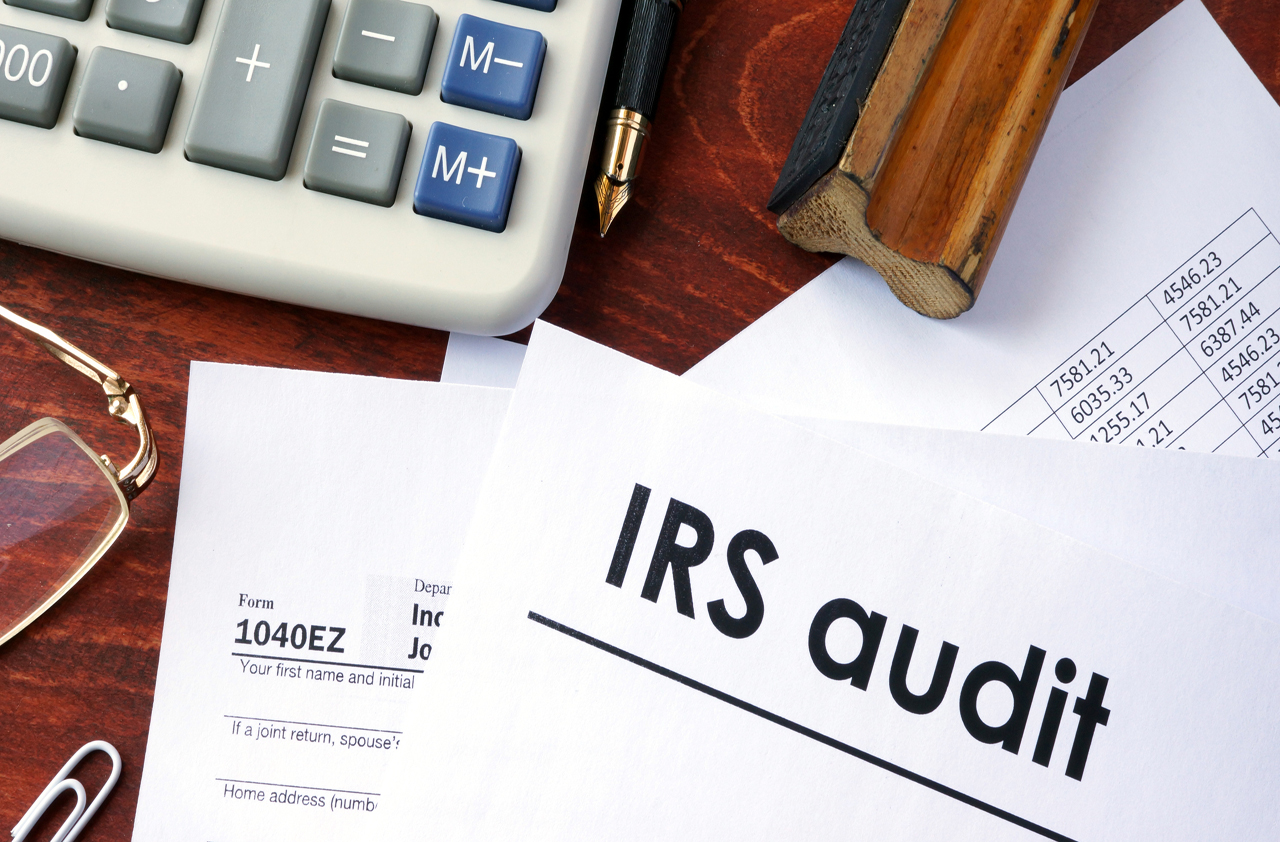Is Your Company Ready for the New Partnership Tax Audit Rules?
Unless you take action, you could be facing some unpleasant tax consequences.


Profit and prosper with the best of Kiplinger's advice on investing, taxes, retirement, personal finance and much more. Delivered daily. Enter your email in the box and click Sign Me Up.
You are now subscribed
Your newsletter sign-up was successful
Want to add more newsletters?

Delivered daily
Kiplinger Today
Profit and prosper with the best of Kiplinger's advice on investing, taxes, retirement, personal finance and much more delivered daily. Smart money moves start here.

Sent five days a week
Kiplinger A Step Ahead
Get practical help to make better financial decisions in your everyday life, from spending to savings on top deals.

Delivered daily
Kiplinger Closing Bell
Get today's biggest financial and investing headlines delivered to your inbox every day the U.S. stock market is open.

Sent twice a week
Kiplinger Adviser Intel
Financial pros across the country share best practices and fresh tactics to preserve and grow your wealth.

Delivered weekly
Kiplinger Tax Tips
Trim your federal and state tax bills with practical tax-planning and tax-cutting strategies.

Sent twice a week
Kiplinger Retirement Tips
Your twice-a-week guide to planning and enjoying a financially secure and richly rewarding retirement

Sent bimonthly.
Kiplinger Adviser Angle
Insights for advisers, wealth managers and other financial professionals.

Sent twice a week
Kiplinger Investing Weekly
Your twice-a-week roundup of promising stocks, funds, companies and industries you should consider, ones you should avoid, and why.

Sent weekly for six weeks
Kiplinger Invest for Retirement
Your step-by-step six-part series on how to invest for retirement, from devising a successful strategy to exactly which investments to choose.
Partnerships are one of the most commonly used business and estate planning tools, and they come in a variety of wrappers or names, such as traditional partnerships, multimember LLCs, joint ventures, limited partnerships and limited liability partnerships. So, it’s significant that starting this year, the way they are audited and taxed has undergone a sweeping change. The result: People operating under partnerships must update their agreements and be ready to cooperate with each other or face the possibility of paying higher taxes.
All partnership entities, even small companies with as few as two partners, members or shareholders, are affected by new audit rules put in place by the Bipartisan Budget Act of 2015. The law, which went into effect on Jan. 1, 2018, established new rules for the federal income tax audits of partnerships, LLCs, limited partnerships and S corporations. These rules require new language for any partnership or other governing agreement.
For example, the concept of a Tax Matters Partner is now replaced with a Partnership Representative, which comes with greater authority. A Partnership Representative must be designated to communicate with the Internal Revenue Service (“IRS”) in the event of an audit. That representative may, but is not required to, be a partner. The Partnership Representative must have a substantial presence in the United States, have a U.S. address, and a U.S. Tax ID number. This allows the IRS to communicate with one designated representative within the partnership who has sole authority to act on behalf of the partnership.
From just $107.88 $24.99 for Kiplinger Personal Finance
Become a smarter, better informed investor. Subscribe from just $107.88 $24.99, plus get up to 4 Special Issues

Sign up for Kiplinger’s Free Newsletters
Profit and prosper with the best of expert advice on investing, taxes, retirement, personal finance and more - straight to your e-mail.
Profit and prosper with the best of expert advice - straight to your e-mail.
A Big Change That Could Mean Higher Tax Rates
More important, these new rules allow the IRS to assess and collect taxes during an audit at the partnership level. In other words, the tax would be paid by the partnership at the highest individual or corporate tax rate. Traditionally, partnerships were purely flow-through entities that did not pay taxes. Any income would be passed out to the partners, who would then pay the tax at their individual or corporate tax rate. The partner’s individual rate is often lower than the highest individual tax rate. The assessment of the tax at the company level will typically result in more tax being paid.
Under the new rules, individual partners may not participate in the audit. An individual partner may not appeal the audit findings or assessment. This is a dramatic change from earlier years. Electing out, as discussed below, permits individual partners to participate in the audit and appeal the audit findings.
Additional complexity may also occur with partners who leave or disassociate after the year in which the partnership earns the income, but before the partnership is assessed additional tax in an audit. As indicated above, collection of this “partnership tax” and any penalties and interest is made at the partnership or company level. This is very important because the partners who bear the burden of paying the tax may not be the same people who were partners during the year under review or audit.
For example, if a partnership is audited for the 2016 tax year when the partners were Joe, Bob and Mike, and the audit is completed in 2019 when Dan and Edward are partners, then Dan and Edward may bear the burden of the tax liability even though they did not benefit from the tax filing.
Partnerships can elect out of these new rules under IRC Section 6221(b), but that election must be made each year. Given the potential for a higher tax liability on any amount of income assessed, partnerships would seem to want to make this election each year. Be sure to discuss that alternative with your tax adviser each year before your return is filed.
Note that a partnership interest held “in trust” is generally not eligible to elect out of the rules. While no direct statutory authority exists to evidence an exception for revocable trusts, they are typically viewed as “disregarded” entities for tax purposes. We suspect that this would permit an election out for a partnership interest held in a revocable trust. However, we do not yet have a guidance from the IRS on this issue.
How to Elect Out of These New Rules
The new tax law provides for certain elections to be considered in the event of an audit. Each election is described below:
Section 6221(b) election
Allows partnerships to opt out of partnership level tax collection and opt back in to the partner level collection. An election to opt out is made on a timely filed return. Once an election is made, the election is generally binding upon all partners. The election can only be revoked with the consent of the IRS. The partnership agreement should address the decision-making process for the election by the partners.
- To be eligible: (1) The partnership must have no more than 100 partners; (2) The partners must be individuals, a C Corporation or an estate of a deceased partner; and (3) Partnership interests owned by trusts are not allowed to use the opt-out election.
- If the election is made: The partnership must notify each partner of the election, the election must be made annually on a timely filed return, and the partnership must provide the IRS with the names or Employer Identification Number of each partner.
- If not elected, any audit will be taxed at the highest tax rate during the audit year.
- If not elected, the net investment income tax (NIIT) and alternative minimum tax (AMT) assessment at the partnership level could avoid partner-level NIIT and AMT.
- Partnership level taxation may save on state income taxes and could offset the higher rate that is associated with the new law.
Section 6226 election
Allows partnerships to shift the responsibility back to the partners by issuing a statement within 45 days of receipt of a notice of adjustment from the IRS.
- Each partner becomes responsible for their share of the adjustment tax.
- The partnership must issue a statement to each partner and the IRS (through a K-1) within 45 days of final notice of the adjustment.
Section 6225 option
Allows partnerships to reduce the taxes they owe in certain situations. This is a helpful option if partners have entered or exited the partnership and an audit has commenced during that time. This option requires participation of the partners from prior years.
In computing the imputed underpayment amount (IUA), a partnership may disregard any amount correctly reported on the partner’s returns if, within 270 days of receipt of the notice of proposed adjustment:
- The partnership issued an amended K‐1 to at least one partner and at least one partner files an amended return consistent with the amended K‐ 1 and pays all tax in full; or
- At least one of the partners from the audited year is tax‐exempt; or
- A lower rate should apply because a partner is a C Corporation or because an adjustment is made to a qualified dividend or capital gain.
The Bottom Line for Partnerships
First, businesses or activities conducted as LLCs, partnerships, joint ventures, limited partnerships or limited liability partnerships should review these rules and the ownership structures. If there is a desire to opt out of the new rules, be certain that you do not have any ineligible partners or members. The determination of whether there is an ineligible partner or member is made on Jan. 1 of each year.
Second, review the partnership agreement to ensure that the agreement is consistent with these requirements. Additional liability protection may be appropriate for the Partnership Representative in the agreement.
The duties agreement should consider the following:
- The Partnership Representative’s duties.
- The process for the designation and removal of the Partnership Representative.
- The partners’ consent that may be required, if any, for tax elections or settlements made by the Partnership Representative.
- How to ensure that the appropriate partners and former partners pay the appropriate allocation of partnership tax assessed at audit.
- Appropriate indemnification of the Partnership Representative.
- Restrict transfers of partnership interests to prevent admitting partners who are ineligible to opt out.
- The requirements for the partners and the Partnership Representative to obtain and provide information that may be needed to minimize or avoid any tax liability.
- Partners’ notice of IRS or state tax audits and rights to participate internally in connection with IRS or state income tax audits.
Jennifer Barcellos, law clerk at the Goralka Law Firm, contributed to this article.
Profit and prosper with the best of Kiplinger's advice on investing, taxes, retirement, personal finance and much more. Delivered daily. Enter your email in the box and click Sign Me Up.

John M. Goralka is Senior Counsel at CunninghamLegal in Sacramento, California. John joined CunninghamLegal because of the firm's high degree of professionalism, commitment to client service and creative ability to provide solutions. For decades, John has helped thousands of families and business owners protect, preserve and pass on their wealth with confidence. Through The Goralka Law Firm, founded in 1996, Mr. Goralka and his team built a reputation for designing practical, tax-efficient estate plans that truly worked when families needed them most. He is one of the few attorneys in California who is dual-certified as a Specialist in both Taxation Law and Estate Planning, Trust & Probate Law by the State Bar of California Board of Legal Specialization.
-
 Farmers Brace for Another Rough Year
Farmers Brace for Another Rough YearThe Kiplinger Letter The agriculture sector has been plagued by low commodity prices and is facing an uncertain trade outlook.
-
 Nasdaq Leads a Rocky Risk-On Rally: Stock Market Today
Nasdaq Leads a Rocky Risk-On Rally: Stock Market TodayPresident Trump said he will decide within the next 10 days whether or not the U.S. will launch military strikes against Iran.
-
 Over 65? Here's What the New $6K Senior Tax Deduction Means for Medicare IRMAA
Over 65? Here's What the New $6K Senior Tax Deduction Means for Medicare IRMAATax Breaks A new tax deduction for people over age 65 has some thinking about Medicare premiums and MAGI strategy.
-
 When Estate Plans Don't Include Tax Plans, All Bets Are Off: 2 Financial Advisers Explain Why
When Estate Plans Don't Include Tax Plans, All Bets Are Off: 2 Financial Advisers Explain WhyEstate plans aren't as effective as they can be if tax plans are considered separately. Here's what you stand to gain when the two strategies are aligned.
-
 Counting on Real Estate to Fund Your Retirement? Avoid These 3 Costly Mistakes
Counting on Real Estate to Fund Your Retirement? Avoid These 3 Costly MistakesThe keys to successful real estate planning for retirees: Stop thinking of property income as a reliable paycheck, start planning for tax consequences and structure your assets early to maintain flexibility.
-
 I'm a Financial Planner: These Small Money Habits Stick (and Now Is the Perfect Time to Adopt Them)
I'm a Financial Planner: These Small Money Habits Stick (and Now Is the Perfect Time to Adopt Them)February gets a bad rap for being the month when resolutions fade — in fact, it's the perfect time to reset and focus on small changes that actually pay off.
-
 Social Security Break-Even Math Is Helpful, But Don't Let It Dictate When You'll File
Social Security Break-Even Math Is Helpful, But Don't Let It Dictate When You'll FileYour Social Security break-even age tells you how long you'd need to live for delaying to pay off, but shouldn't be the sole basis for deciding when to claim.
-
 I'm an Opportunity Zone Pro: This Is How to Deliver Roth-Like Tax-Free Growth (Without Contribution Limits)
I'm an Opportunity Zone Pro: This Is How to Deliver Roth-Like Tax-Free Growth (Without Contribution Limits)Investors who combine Roth IRAs, the gold standard of tax-free savings, with qualified opportunity funds could enjoy decades of tax-free growth.
-
 One of the Most Powerful Wealth-Building Moves a Woman Can Make: A Midcareer Pivot
One of the Most Powerful Wealth-Building Moves a Woman Can Make: A Midcareer PivotIf it feels like you can't sustain what you're doing for the next 20 years, it's time for an honest look at what's draining you and what energizes you.
-
 I'm a Wealth Adviser Obsessed With Mahjong: Here Are 8 Ways It Can Teach Us How to Manage Our Money
I'm a Wealth Adviser Obsessed With Mahjong: Here Are 8 Ways It Can Teach Us How to Manage Our MoneyThis increasingly popular Chinese game can teach us not only how to help manage our money but also how important it is to connect with other people.
-
 Looking for a Financial Book That Won't Put Your Young Adult to Sleep? This One Makes 'Cents'
Looking for a Financial Book That Won't Put Your Young Adult to Sleep? This One Makes 'Cents'"Wealth Your Way" by Cosmo DeStefano offers a highly accessible guide for young adults and their parents on building wealth through simple, consistent habits.